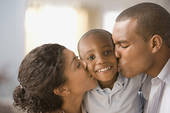What to do if Your Child Steals
Your child steals! That’s what you just found out from the teacher and principal at the school. Your head spins, you can barely breathe. The words, “your child steals” is ringing in your ears and making your dizzy.
Then the words, “your child steals” turns to anger and fear that you are a bad or irresponsible parent. You tell your child to go to the bedroom because you don’t know what to do. When your partner finds out that your child cheats you both put aside all your own troubles and begin to unite in an interrogation of your child. In order to punish and eradicate the behavior you take privileges away; you disparage your child, and maybe even beat them up verbally and or physically. At that time it takes care of your shock. It releases the anxiety and shock in your mind and body. It brings you together as a couple. Now you have something to come together on, and have a common issue to focus on other than your tense and unfulfilling relationship.
Your Child Steals – Why?
As a child and family therapist for over 25 years, I have come to understand that children steal to draw attention to the fact that they are stressed in an atmosphere of uncertainty, and feel the need to be in control. They aren’t able to put their confused feelings into words, especially when parents are having communication issues and don’t present a safe, stable and emotionally available front. Children are desperate to make things okay between their parents and will do anything, including harm themselves in order to unite them. When children cause some alarm, they get their parents to come out of their bubble of tension and focus on the child. In effect the child rescues the parents, but only for a short time.
One child may attempt to manage their parent’s behavior by telling dad not to yell at mom, or comforting mom by doing chores for her. Another child steals to take control of uncertain situations, to avoid the helplessness that might otherwise set in and lead to anxiety, depression or stress related health problems.
The actual items that the child takes are rarely relevant. It’s common that the child doesn’t want those particular things. The child steals and hides the items hoping to be found out. It’s not that they don’t have enough toys, food, high tech stuff or anything else. It’s about giving themselves something concrete that they are missing at home – and that’s emotional nurturance and stability.
A Child Steals When Life is Uncertain and Parents are Having Troubles
Mia, an eight-year-old became a child who steals when her parents’ relationship took another downward spiral making home life treacherous. Would her Dad Anderson leave, or just hang around in an alcoholic stupor? Would her mom Sandy just busy herself as usual and stay locked away on the phone talking to her mother about Anderson.
At the end of first grade her parents were informed that she had been found with another child’s pencil case, and Miley Cyrus memorabilia. She was later seen taking another girl’s jewelry and hiding it in her backpack. Her parents were horrified, especially since they felt strongly about teaching their children right from wrong and good values. They made Mia return the items and apologize. But they still had to deal with the shock and ensure that Mia didn’t remain a child who steals.
Sandy and Anderson’s marriage had always been rocky especially when the children came along. Even in the early days, Anderson couldn’t seem to satisfy Sandy’s demand for structure, ‘openness’ and emotional safety. Sandy wasn’t able to meet Anderson’s need for acceptance, closeness without judgement and spontaneity. They struggled constantly about their differing needs and how to bring them together in comfortable ways. It was Mia who was the glue. She would try to make Sandy feel better when Anderson was doing his work on his phone, zoned out on alcohol. And it was Mia who cuddled up with Anderson when Sandy yelled at him about being a useless partner.
Anderson and Sandy went to couples therapy off and on. They never completed their work of growth and development in the therapeutic arena. They used therapy to vent and blame, and then went back to their precarious marriage.
But when Mia became a child who steals they had a crisis that was no longer just between them. Mia couldn’t contain their issues and not cry out for help under the load. She stole things to protest that she couldn’t be the grown up anymore. Sandy and Anderson returned to therapy to discuss parenting Mia, but they spoke mostly about their strained relationship. Parenting counseling had to be incorporated into their own therapy.
Mia also had her own therapy so that she had someone to help her express her fears about her parents, and make it okay for her to be a kid who wasn’t responsible for her parents relationship. Simultaneously Sandy and Anderson worked on themselves as individuals and as a couple. Family counseling was later introduced to help Sandy, Anderson and Mia work out their roles and responsibilities as well as the continued need to share feelings before they got acted out when a child steals.
Mia, a bright, curious and overburdened child who steals, shook things up at home by creating a crisis – forcing her parents back into therapy to find a way of stabilizing their relationship, allowing Mia to have her childhood in safety.
What to do if your child steals
- Acknowledge that they are under stress
- Share your own stress so that they don’t feel you are going to be angry or dismiss them if they talk about their feelings
- Talk as much as you can about your feelings as a parent – it unburdens the child who steals
- Share feelings verbally with your co-parent no matter what the conflict is – it releases tension, and removes the fear from the child who steals that you might split up and its the child’s fault.
- Go to family counseling and or couples counseling and work it through
copyright, Jeanette Raymond, Ph.D. 2017
You might also like:
Manage your anger when your kids drive you nuts
Six ways to defuse your anger when your kids fight


